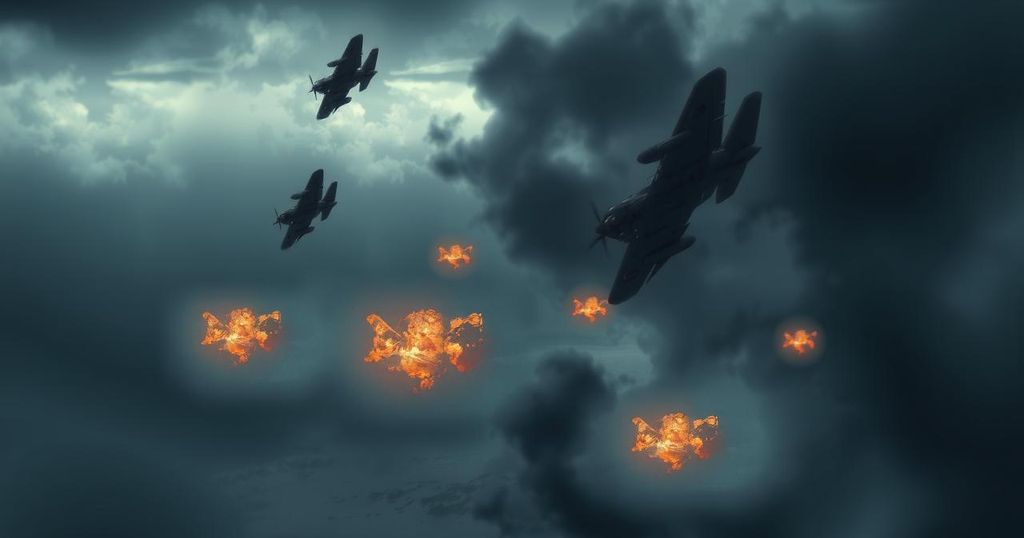The US has escalated aerial attacks against Yemen’s Houthi rebels, aiming to stop assaults on Red Sea shipping under “Operation Rough Rider.” Analysts express skepticism about the effectiveness of these strikes, suggesting they may strengthen Houthi ties with Iran. As the US continues its operations, the expected impact on regional dynamics remains unclear, especially with critical nuclear talks postponed.
The United States has significantly ramped up its aerial campaign against the Houthi rebels in Yemen since March 15, labeling the initiative “Operation Rough Rider.” Reports indicate that more than 1,000 targets have been struck, all in an effort to curb Houthi aggression against shipping in the Red Sea. This increased military action also aims to exert pressure on Iran amid ongoing nuclear negotiations. However, experts doubt the effectiveness of this extensive bombing campaign.
Colin Clarke, who is the director of policy and research at the Soufan Group, criticized the perceived impact of the US strikes. He remarked that although some Houthi infrastructure has been decimated and there have been casualties within their ranks, the group appears to be leveraging the conflict to their advantage. “Any losses are likely short-term and temporary,” Clarke emphasized, citing a surge in both recruitment and fundraising efforts among the Houthis.
Jeremy Binnie, a defense analyst at Janes, also raised concerns about the Houthis’ ongoing ability to conduct strikes, particularly against Israel and US-operated drones. Such attacks undermine US assertions that the American military efforts have significantly degraded Houthi capabilities. Binnie noted, “It is arguably getting increasingly embarrassing for the United States every time the Houthis launch an attack on Israel or shoot down an MQ-9.”
The situation is further complicated by a recent incident involving the US Navy: an F/A-18 fighter experienced difficulties and fell from the USS Harry S. Truman while maneuvering to evade a Houthi missile strike. This incident has reinforced the narrative that the Houthis maintain a formidable and persistent threat. Despite claims from US Central Command that the bombing campaign has diminished the frequency and effectiveness of Houthi strikes, analysts remain skeptical.
For instance, CENTCOM reported on April 27 a 69 percent drop in ballistic missile launches from the Houthis and a 55 percent decline in drone attacks. They insisted that Iran’s support has allowed the Houthis to repeatedly attack US forces, linking this outside backing to the rebels’ sustained aggression.
Interestingly, while the US has been conducting these airstrikes, experts caution that it may be inadvertently consolidating relations between the Houthis and Iran. Deigned a terrorist organization by the US, the Houthis are integral members of Iran’s “axis of resistance,” which consists of various nonstate actors. Emerging from the Gaza conflict in October 2023, the Houthis have increased their actions against Israel, claimed strikes on Israeli and pro-Israeli vessels, citing solidarity with Palestinians.
As to their dependence on Iran, analysts note that while the Houthis exhibit some autonomy due to their newfound prominence, they still rely heavily on Iranian resources for weaponry and strategic planning. US Defense Secretary Pete Hegseth publicly warned Iran, stating, “You will pay the CONSEQUENCE at the time and place of our choosing,” indicating that the US is attuned to the implications of its military actions in the region.
Yet, Clarke suggests the ongoing aerial campaign might actually deepen the alliance between the Houthis and Tehran, raising doubts about the effectiveness of future nuclear negotiations. “If anything, the strikes have pushed the Houthis closer to Iran,” he stated, expressing skepticism regarding any prospective changes in Tehran’s conduct.
Binnie echoed this sentiment, noting that US hopes for increased pressure on Iran through military action may be miscalculated. Furthermore, a fourth round of nuclear discussions that was supposed to take place on May 3 in Rome has been postponed due to what Omani mediators have termed “logistical reasons.” As the US continues its military strategy, it faces pressing questions about the actual strategic value of its current campaign against the Houthis.
In conclusion, while the United States has intensified its bombing campaign against Yemen’s Houthi rebels, questions arise regarding the effectiveness of this military approach. Analysts suggest that the strikes may not only fail to deter Houthi attacks but might also strengthen ties between the Houthis and Iran. With upcoming nuclear discussions postponed, the strategic implications of the campaign remain uncertain, leaving the US at a crossroads in its policy in the region.
Original Source: www.rferl.org




